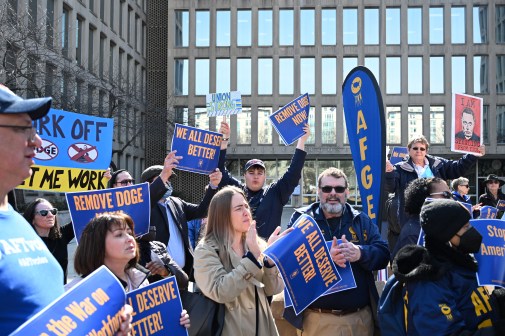RIF’d Education Department civil rights staff looks to shutdown deal for job protection

Federal worker advocates are hoping Congress’s bill to reopen the government is a lifeline for some employees, including Education Department staffers who were laid off from their roles long before the shutdown began.
AFGE Local 252, the union representing the Education Department, told FedScoop it believes the roughly 265 workers in the Office for Civil Rights (OCR) should be protected from the agency’s RIFs, arguing the employees’ final termination emails were sent during the shutdown and qualify for a provision in Congress’s shutdown deal.
The deal, primarily focused on short-term funding measures for agencies, features a provision voiding the reduction-in-force actions that occurred during the 43-day shutdown. While the language appears to focus primarily on RIFs initiated during the shutdown, the union — along with other advocacy groups and legal experts — contends it is broad enough to encompass more than just initial RIF notices.
Reading between the lines
The nearly 265 OCR workers received termination emails on Oct. 14 — about two weeks into the shutdown — after a federal appeals court ruled on Sept. 30 that the agency could proceed with firing nearly half of the agency’s civil rights enforcement staff.
While these workers were first laid off as part of Education’s agency-wide RIFs in March, some are interpreting the language of Congress’s shutdown deal to include any RIF-related actions executed between Oct. 1 and Jan. 30, regardless of when workers were first notified.
The provision reads: “Any reduction in force proposed, noticed, initiated, executed, implemented, or otherwise taken by an Executive Agency between October 1, 2025, and the date of enactment, shall have no force or effect.”
President Donald Trump signed the deal Wednesday night to reopen the government.
“By the language of the continuing resolution, the agency cannot move forward with implementing or executing a firing for that specific set of employees from the Department,” AFGE 252 said in a statement. “The department did not issue notices to these staff after they were included in the injunction, so we do not expect the Department to affirmatively reach out about this.”
Under this argument, the estimated 265 workers would be protected in the same way as the 137 OCR employees and hundreds of other ED employees who received RIF notices in October. Hundreds of federal employees across the government were laid off in October after the Trump administration pledged mass RIFs amid a battle with Democrats over the shutdown.
Some State Department workers are hoping for a similar interpretation. The American Foreign Service Association, a membership organization for U.S. diplomats, told FedScoop earlier this week that the organization believes “that Congress intended for this language to apply to as many federal employees as possible, including those who received layoff notices from the department on July 11th.”
According to a State Department frequently asked questions sheet on the RIFs, last updated Oct. 30, the date for foreign service employees impacted by the RIF was still Nov. 10, with their last payment coming Nov. 26.
Administrative law and civil service experts agree with this line of thinking. Nick Bednar, an associate law professor at the University of Minnesota, told FedScoop earlier this week that the broad language covers both the initial notice and the carrying out of RIFs for the State Department.
When later asked about Education’s OCR workers, Bednar said the language still should apply, even when a court ruled the terminations could move forward.
“The law itself is very clear that any RIFs that would have been finalized during the shutdown should be invalidated,” Bednar told FedScoop in an interview Thursday, adding that “Congress can always use its legislative authority to invalidate the personnel actions of the executive branch. So if Congress wants to say this RIF is invalid, Congress can do that, regardless of what the courts say.”
A confusing return to work
As workers returned to the office Thursday, union leaders said it was a “rocky” process for some.
“Employees have not received official notice from the Department’s human resources office to return to work, instead being forced to rely on text messages from supervisors or colleagues,” AFGE Local 252 President Rachel Gittleman said in a statement Thursday. “Many employees named in the October firings are locked out of their computers and do not have access to Department email. The Department told some of those employees that their accounts have been disabled, even though they remain employed by the agency.”
The employees who were laid off in the shutdown-related RIFs received notices with a separation date of Dec. 9 or Dec. 10, the union later confirmed, meaning they were still expected at work Thursday, regardless of the congressional deal.
According to the Education Department, workers are required to reset their account passwords if their computers are inactive for 30 days. The agency said furloughed workers were told to come back and reset their passwords to avoid disruption, though some did not. It is not clear how the employees were notified and whether RIF’d workers were informed as well.
Donald Kettl, professor emeritus and former dean of the University of Maryland School of Public Policy, warned that the process to resume full operations of the federal government is complex under normal circumstances, but even more so given this year’s significant workforce changes.
“Most of what the federal government does doesn’t have on and off switches, and so it gets to be that much more difficult to get the federal programs back in gear,” Kettl said.
“And the thing about technology in particular is that most of the process of running technological systems and upgrading technological engines are not things that can be done with a short time horizon,” he added. “They really need a long perspective.”
Madison Alder contributed to this article.






